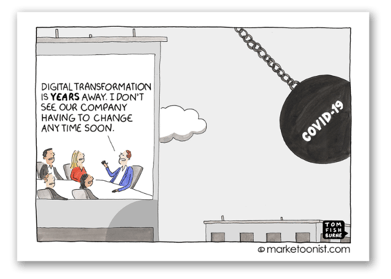Blog
From Responsive Web Design to Responsive e-Learning Design
Great Resignation1, Great Realization, Reckoning, Regaining, Reimagining, Reset, or Rework – call it what you will; it’s impacting us all, for better ...

Search Our Blogs
Blog Categories
Subscribe to Our Blogs

The Great Resignation: A Look at Employee Retention
Great Resignation1, Great Realization, Reckoning, Regaining, Reimagining, Reset, or Rework – call it what you will; it’s impacting us all, for better or for worse.
Note: No overused words (i.e. pivot, unprecedented, uncertain) were used in the writing of this blog. 😊Are you one of the 4.4 million people who quit their job last month? Have you been left to fill in the gaps for the co-worker who left?
Staggering Statistics in the U.S. Workforce show:
- 55% of employees plan to look for a new job in the next 12 months
- Approximately 48 million people, 1 in 3, quit their jobs in 2021 (This is an annual record)
- November 2021 was a record-breaking month with 5 million people resigning
- 45% of U.S. employees feel overworked
- U.S. employees value workplace flexibility more than higher pay and job security
Why

Of course, the life-altering pandemic provided a great opportunity for all of us to look at our lives, values, and work. Digital transformation literally came in like a wrecking ball and, like it or not, most of us got to try work-from-home for an extended period of time.
There are all kinds of reasons for the massive increase in employees resigning from their jobs, but as with most changes we mere humans make, the big reasons seem to fall into one of two camps.
1. We were already unhappy in our current positions
2. The opportunity for change was too good to pass up
Thank you to those who participated in the recent soft-sounding on this topic and how it's affecting you and your organization. Wow! The response was great and many of you are so passionate. I've used much of your feedback in this blog. If you didn't get a chance to respond, I'd love your thoughts. Send me a note at lstortz@alleni.com!
- Have you resigned from a position in the last 2 years?
- How likely are you to resign from a position in the coming year?
- In your circle, how many would you estimate have resigned in the past two years? How many do you anticipate resigning in the next year? (i.e. 1 in 10, 2 in 5, etc.) Have you noticed a split between men and women?
- What are the reasons that you feel either yourself or those you know are resigning or will use to resign in the future?
Enough
Historically, we have overcome many of the challenges in our workplace by leaning into the camaraderie with colleagues or structuring our day to make it more manageable. All of that changed when COVID hit the work landscape; stress points were tested, priorities and preferences were evaluated, and many people reached their breaking point when it came to inequalities/unhappiness in the workplace.
Enough was enough.
.png?width=240&name=Services%20-%20Great%20Resignation%20Blog%20Graphics%20(1).png)
This is an old video, but one that still makes me chuckle, and unfortunately many inequities still exist.
Factors related to the pandemic may have contributed to the start of "The Great Resignation," but the trend continues as employees now more than ever:
- Seek more meaningful work that better aligns with their personal lives/values
- Believe employers are being unreasonable and shortsighted by demanding they return to in-person environments when remote work was proven a successful alternative
- Value flexibility in their schedules, locations, and time off
- Benefit from sign-on bonuses, time off for causes important to them, and better cultural fits
- Are choosing to live where they want instead of being tethered to their employer's location
.jpg?width=484&name=shutterstock_1786572482%20(3).jpg)
Good News: It’s become an employee candidate market and companies should be taking a good look at themselves and how the workforce is treated. The companies who are looking inward and making changes vs. blaming outside reasons (the pandemic, Government, supply chain, unemployment, etc.) will attract the right workforce and succeed in the long term.
Challenge: With employees leaving at record rates, it’s hard to fill in the gaps until they are replaced. Many companies are finding it challenging to find the right talent to replace the employees, or are choosing to eliminate positions altogether, adding even more stress to the existing (now understaffed) teams.
Grass is Greener
The need for relocation was previously one of the biggest barriers to making a job change. With remote work opportunities, that barrier has been removed. Workers can change jobs quickly and easily with minimal disruption to their families/lifestyle if they were already working remotely.
Record low unemployment numbers fueled better opportunities, and with remote work becoming the norm, employees were more comfortable exploring their options. Reviewing opportunities was accelerated through technology, interviews moved at record paces being conducted online, packages could be enhanced as re-location budgets could be re-allocated, and employees were feeling the value of their worth.
Good News: This is how it should be. Employees shouldn’t feel captive to their employer, and employers should continuously look at how to better engage their workforce and ensure they feel valued.
Challenge: Not all companies were/are ready to recruit in this new world. Some companies simply cannot compete for the right talent with the speed and sheer numbers of the Great Resignation environment.
As Leaders, What Can We Do?
Look inside, not out. Yes, factor in outside influences, but take a good hard look inside.
Let’s consider some of the following:
- Ask and listen! What do our current employees want? How about our optimal recruits? Let’s not make an arbitrary decision from the top or assume. Let’s ask, listen, and respond.
- What can we do for our Workers who have to fill in for those who have left? How can we help them manage through the change? Should we replace the positions, change the workflows, or automate?
- Reward current employees. As we look to offer more to new candidates – let’s take care of the ones we have (because other employers will). Can we offer higher pay? Can we enhance non-pay benefits (time off for causes/volunteer), unlimited vacation, or other non-pay benefits? I recently hired a colleague, and we incorporated three hours a week of learning time on anything she’s interested in. (Go Terra!)
- Measure success differently. Can we continue to measure output vs. time put in?
- Manage burnout and digital overload. Limit screen time (as we would with kids!) Do you need employees on screen all the time? When will a simple phone call suffice? I started doing “walkie-talkies” with our Lead Producer so she can get away from her screen and take a break to walk her dog. This allows us to catch up yet be off-screen, where we spend the majority of our day.
- Automate! Consider automating the mundane tasks to help ensure our team members have more meaningful work. The trend toward automation has been accelerated with The Great Resignation. It’s a great opportunity to consider the mix of our workforces (bots, robots, artificial intelligence, XR, digital assistants/waiters, IoT, etc.) Stay tuned, lots more on this to come in future blogs.
- Be flexible. Recognize that flexibility has become one of the leading competitive advantages when recruiting and retaining employees. Again, let’s not assume we know what employees want without asking. Microsoft reported 73% of employees want remote work and 67% want in-person time with coworkers.
- 1 in 3 do not want to work for a company without a remote/partial remote working option
- Hybrid location options may be the key. The good news is that 82% of employers with budget control envision a hybrid work model
As Individuals, What Can We Do?
Continue to take control of our work and personal lives. The pandemic sparked a thought in many of us; what if this is it? Am I doing work I value? Is it fulfilling? Let’s continue to take some time to reflect on why, how, and where we work. It may be healthy to look at some options and know our market value. Look at various companies and what they choose to offer their workforce. Assess what we expect/need from our company, which won’t be the same for all of us.
Thank You Scott!
.jpg?width=100&name=Scott-1%20(1).jpg) One of the Allen Interactions co-founders, and my dear business partner of 17 years, was part of The Great Resignation. Many of you met Scott over the 25+ years he was with us, whether at one of the hundreds of trade shows, speaking engagements, or connections through our work. We miss him greatly and wish him all the best.
One of the Allen Interactions co-founders, and my dear business partner of 17 years, was part of The Great Resignation. Many of you met Scott over the 25+ years he was with us, whether at one of the hundreds of trade shows, speaking engagements, or connections through our work. We miss him greatly and wish him all the best.
1The Great Resignation was a phrase describing the trend of people leaving their positions; coined by Anthony Klotz, Organizational Psychologist and Professor at Texas A&M University May 20211.

About the Author: Lisa Stortz
Lisa loves to learn about everything! She is an experienced and passionate solutions architect. She has the gift of building strong and lasting client relationships with measurable learning and business performance outcomes. Her areas of expertise include Onboarding, Sales Enablement, Leadership, Marketing, and Strategic Planning.
Comments
Would you like to leave a comment?
Related Blog Posts

By: Lisa Stortz | Nov, 2015
Category: Custom Learning, Digital Engineering, Strategic Consulting

Blog
Q&A: Migrating ILT to Digital Delivery
Great Resignation1, Great Realization, Reckoning, Regaining, Reimagining, Reset, or Rework – call it what you will; it’s impacting us all, for better ...
By: Lisa Stortz | Mar, 2020
Category: Custom Learning, Allen Interactions Team

Blog
Five St. Patrick's Inspired Instructional Design Traditions
Great Resignation1, Great Realization, Reckoning, Regaining, Reimagining, Reset, or Rework – call it what you will; it’s impacting us all, for better ...
By: Lisa Stortz | Mar, 2016
Category: Custom Learning


